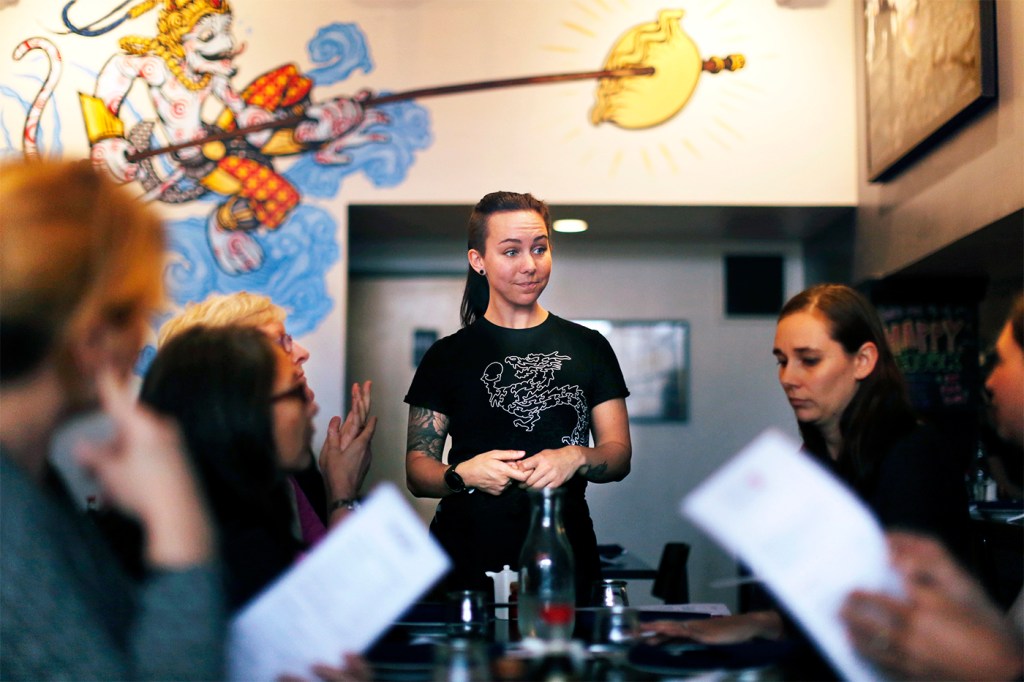What are the pros and cons of raising the minimum wage for tipped workers?
The issue of balancing wages and tipping for restaurant workers has been raised in at least a dozen states, says Patricia Illingworth, a Northeastern professor of philosophy and business.

Should the full minimum wage be paid to restaurant workers who currently receive tips?
That is the ballot question — Question 5 — being asked of voters in Massachusetts on Tuesday.
Under current Massachusetts law, restaurant workers receive an hourly salary that amounts to less than half of the standard $15 minimum wage — the idea being that tips can make up the difference. If tips do not make up the difference, employers are required to make up the gap to meet the $15 wage.
The issue of balancing wages and tipping for restaurant workers has been raised in at least a dozen other states, says Patricia Illingworth, a Northeastern professor of philosophy and business.
“There are certain burdens that tipped workers face,” says Illingworth, who is also a lecturer in law and public policy. “They don’t really know how much money they’re going to make. They don’t know which shifts they’re working. All of this makes them very dependent upon customers.
“When you combine that with the motto that ‘the customer is always right,’ it can leave the workers in a very vulnerable position.”
Illingworth, who is writing a book on tipping to be published in 2026, discussed the issue with Northeastern Global News. Her comments have been edited for brevity.

Why are some people in favor of raising the minimum wage for tipped workers?
There is a sub-minimum wage for tipped workers that is lower than the standard minimum wage in Massachusetts. The standard minimum wage is $15 an hour and the sub-minimum wage is $6.75 an hour for workers who receive tips.
When tips fail to raise their pay up to $15 per hour, the employer is supposed to make up the difference. But that doesn’t always happen, and it is difficult to enforce.
Passing this question would ensure that they make at least $15 per hour.
What are the arguments made by people who are against raising the tipped minimum wage?
The arguments are primarily economic. There is a concern that menu prices will go up and fewer people will dine out as a result. They believe some restaurants will go out of business. People also worry that tips may be lower.
Featured Posts
Is there a sense for how restaurant workers themselves feel about this question?
My sense is that it’s mixed. Some restaurant workers support raising their minimum wage and some do not support it. It seems that the main reason they do not support it is fear that they will make less money or that they may lose their jobs if businesses have to cut back.
If the minimum wage is raised, what are the chances that customers will respond by tipping less?
It’s a fair question. But it raises an alternative question: If as predicted menu prices increase a little and people continue to tip 20%, will workers wind up receiving more in tips?
It’s important to note that in Massachusetts the plan is to increase the minimum wage for tipped workers slowly, that is, by 2029.
Which other states have been taking on this issue?
Michigan, Arizona and Ohio are considering similar questions. There’s lots of activism about the tipping minimum wage in New York and Connecticut. At present Alaska, California, Minnesota, Montana, Nevada, Oregon and Washington have endorsed a single minimum wage for workers, though sometimes it depends on the size of the business, or the region.
Is there any evidence coming from those other states about the effect of raising the minimum wage?
I’ve read lots of different opinions, but nothing decisive on this. The California case is interesting because it’s a big state and the pivot was controversial. As far as I can tell, the new minimum wage seems to be working there.
As you’ve researched your upcoming book on tipping, where does the tipping culture overall stand in the U.S.?
Tipping is a hot topic largely because of “tipflation.” People are asked to tip everywhere they go, regardless of what if anything is being done for them. The request for a tip, sometimes accompanied by a suggested amount, and often on a digital pad, can be seen by other people. People are embarrassed not to tip. This has come to be known as “guilt tipping.”
Not surprisingly, there is a backlash against tipping.
During COVID we experienced the “Great Resignation.” Many people left the service industry and did not want to return. This gave restaurant workers some leverage. Restaurants needed servers. The “Great Resignation” turned into the “Great Renegotiation.”
The activism around tipping is part of a much bigger picture for people in the service industry and the industry itself.











